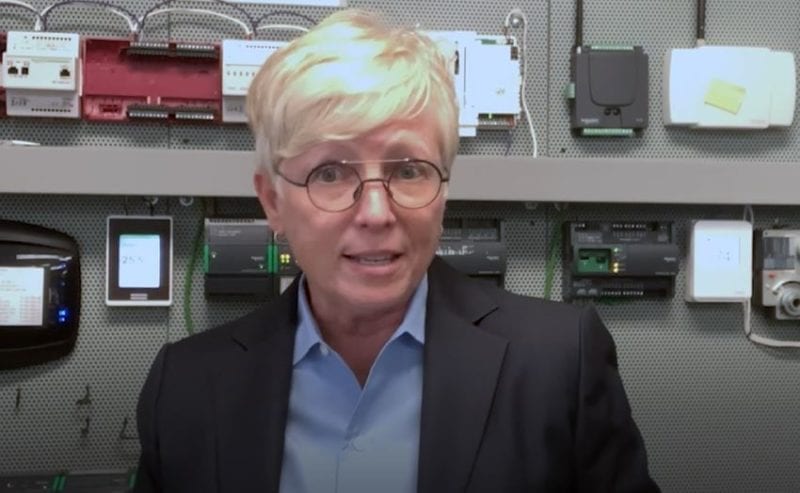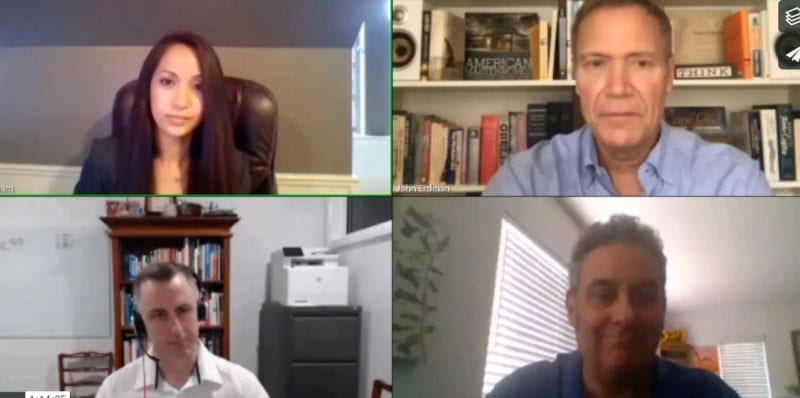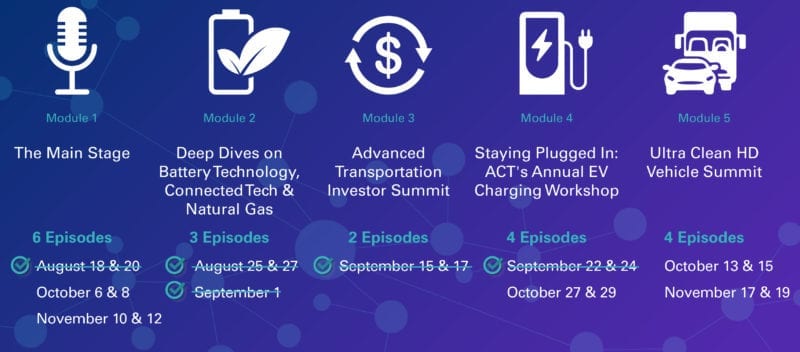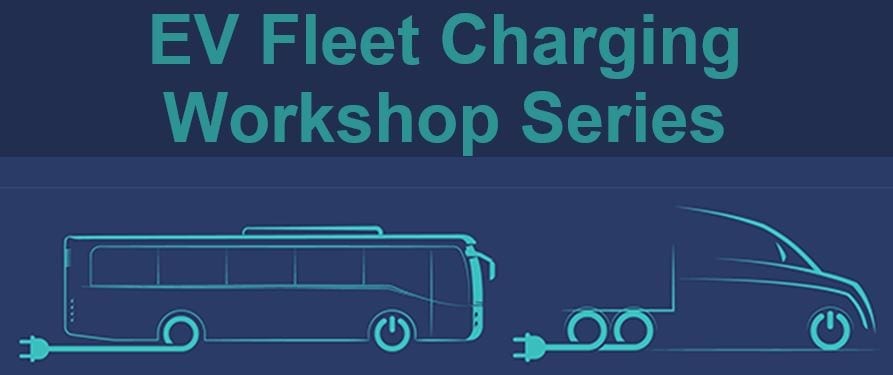Fleet adoption of EVs has grown tremendously over the past year, spurred by the increasing availability of vehicle models and incentive funds, as well as advancements in battery technology. Fleets across the country are hungry for new resources, cutting-edge technologies, and learning opportunities from zero-emission pioneers.
To help create an environment that facilitates these next steps, ACT Virtual is presenting a four-episode digital version of the popular ACT Expo EV Charging Workshop—featuring charismatic keynote speakers, powerhouse executive panels, small-group video networking, and more.
Fleet managers and government employees can register for the EV Charging Workshop for free.
Fleet managers and government employees can register for the EV Charging Workshop for free to participate in the two upcoming days, October 27 and 29. Attendees will hear how the EV charging landscape has evolved, including key lessons learned in fleet charging infrastructure deployments, as well as strategies to control costs, protect assets, and integrate advanced energy management and storage.
Tuesday, October 27: EV Charging Workshop; Smart Charging & Cost Control
Managing and paying for electricity is often uncharted territory for fleets accustomed to paying for fuel with fuel contracts. Fortunately, the technology and its capabilities in managing cost and energy profiles are becoming more robust each day. Hear highlights on the industry’s most popular and groundbreaking software technologies, complemented by a plenary with leading fleets and technology providers on the opportunities and challenges of navigating cost and implementing smart charging solutions. Speakers include:
- Lisa Arellanes, Senior Manager, Business Development & Partnerships, eMobility, Southern California Edison
- Kevin Schnepp, Environmental Program Manager 1 Laboratories Branch, ZEV Special Projects, California Department of Food and Agriculture Division of Measurement Standards
- Anders Thulin, Business Development Manager, Siemens eMobility
- Aaron Young, Utility Partnerships, Electrify America (Moderator)
Thursday, October 29: EV Charging Workshop; Advanced Energy Management with Storage, Solar, Microgrids
Another necessary support framework for fleet electrification is the electrical grid. Powering electric vehicles using solar, storage, and microgrid technology enables fleets to get the electricity they need at a predictable cost. Attend a plenary session with leading fleets and technology providers highlighting the role that these advanced energy management systems play in the future of EV charging, followed by a deep dive “how to” session outlining important funding strategies in utilizing these systems challenges of navigating cost and implementing smart charging solutions. Speakers include:
- Aravind Kailas, Advanced Energy Technology Policy Director, Volvo Group North America
- Jigar Shah, Manager, Distributed Energy & Grid Services, Electrify America
- Jordan Smith, Consulting Engineer, Grid Technology Innovation, Southern California Edison T&D
Highlights from the First Two Episodes
Two dynamic days of online programming already took place in September and content is available to ACT Virtual attendees on demand. Each day featured keynote remarks and a deep dive plenary session on the success stories and the challenges that exist in scaling EV charging infrastructure, closing out with cutting edge technology demonstrations.
Episode 1 Highlights: Tuesday, September 22, 2020 – Best Practices in Scaling EV Charging Infrastructure for Fleet Operations
Episode sponsored by: Shell, Peterbilt
Keynote Remarks: Annette Clayton, CEO and president of Schneider Electric North America

The opening keynote address on September 22 was presented by Annette Clayton, CEO and president of Schneider Electric North America, a global energy and digital automation solutions provider focused on efficiency and sustainability. Clayton shared some of the latest hardware and software energy innovations for EV charging. Schneider’s focus is to empower all to make the most of their energy and resources, ensuring “Life is On” everywhere, for everyone, at every moment. They realize the journey towards electrification is going to be unique. New expertise and analytics will be required to accelerate the worldwide adoption of EVs as a sustainable mobility form. Schneider Electric offers multiple solutions and services to help grow electrification of the transportation market.
Executive Panel: Best Practices in Scaling EV Charging Infrastructure for Fleet Operations
Mike Barnes, Senior Regional Facilities Manager, Penske Transportation Solutions; Michael Gerty, Director of Advanced Research, PACCAR; Henrik Holland, Chief Operating Officer, Greenlots; Natalia Swalnick, Senior Director, Electrification Coalition (Moderator)
The keynote was followed by an executive panel of industry experts in the transportation electrification space. The panel was very enthusiastic about the future of EV charging solutions, noting the accelerated growth of DC Fast Charging to support fleets. Fleet adoption of EVs has grown tremendously over the past year, providing several fleets around the nation with tangible data and experience on what it really means to incorporate into their operation. The EV charging workshop covered the evolution in EV charging deployments for fleets across weight classes and sectors (ranging from light duty to transit and off-road sectors). Panelists examined the challenges in infrastructure deployments and the impact high power charging has and will have on the industry as more heavy-duty EVs hit the road.
Choosing the right equipment partner is key to a successful operation. Some key takeaways include:
- Plan for your future fleet needs
- Engage early with your electric utility
- Design for growth
- Networking software is a critical component
- Have a service plan for unexpected issues with charging
- Training and education for drivers, mechanics, all parties involved is essential
Technology Demonstrations
ACT Virtual finished the day by delivering the latest technology advancements to our fleet attendees, providing the opportunity to participate in two exciting product demonstrations.
- Volvo Trucks North America: Charging Forward with Sustainable Transport Solutions
- Lion Electric: A New Charging Infrastructure Solution from Lion Electric
Episode 2 Highlights: Thursday, September 24, 2020
Episode sponsored by: Shell, South Coast AQMD, Black & Veatch, Electriphi, Freewire, and Tritium
Executive Panel: Choosing the Right Charging Hardware Options for Your Fleet
David Finn, Founder and Chief Growth Officer, Tritium; Randal Kaufman, Sales Director, Black and Veatch; John Erdman, Head of Strategic Accounts, Freewire; Erika Pham, Project Manager, Trillium Transportation Fuels, LLC (Moderator)

Thursday’s session focused on the innovative hardware solutions that have entered the market and the support they are able to provide fleets in electrifying at varying power levels. This session explored how hardware solutions including energy storage, microgrids, and more can be paired to support fleet resiliency and control long-term costs. The panel explored topics including renewable energy, battery energy storage, high-powered charging infrastructure, and the future of hydrogen refueling. Currently there is a growing trend away from AC charging towards DC charging. With so many hardware options available on the market, how does a fleet begin to determine what the best option for them will be? The panelists agreed fleets should engage in upfront planning, working with their local utility, assessing vehicle routes, and future planning as key factors to the successful electrification of their fleet.
Keynote Remarks: Rustam Kocher, e-mobility ecosystem lead of Daimler Trucks North America
The closing keynote address on Thursday was provided by Rustam Kocher, e-mobility ecosystem lead of Daimler Trucks North America. Kocher manages utility engagements for Daimler and leads the standardization effort for the High-Power Charging for Commercial Vehicle (HPCCV) CharIN Task Force. Kocher discussed the importance of charging hardware standards and the evolution of the charging industry to reach mainstream adoption for medium- and heavy-duty EVs. The HPCCV was formed to define a new commercial vehicle high power charging standard to maximize customer flexibility. Kocher also relayed how Daimler is putting electric trucks to the test with battery-electric medium- and heavy-duty trucks. Daimler currently has 26 eCascadias and 12 eM2 vehicles that are being tested by real customers, using real routes, and hauling real freight. Daimler has learned a tremendous amount from these collaborative efforts with customers. The most important lesson is the importance for fleets to involve their local utility from the onset when considering EVs and charging infrastructure. Kocher closed by laying out a roadmap for the future of fleet electrification, from planning for now, to planning for progress in vehicles and charging technologies. Daimler sees the future is electric.
Technology Demonstrations
ACT Virtual wrapped up the day with five cutting edge technology demonstrations available for ACT News readers to view here:
- XL Fleet: Electric Silverado HD
- ChargePoint: Designing for Mission Critical: The EV Fleet Solution for Maximum Uptime
- Freewire: Ultrafast EV Charging for Fleets
- Electriphi: Do You Know Your EV Fleet TCO?
- Coulomb Solutions Inc.: High Voltage Accessories for Commercial Vehicle Electrification
Secure Your Ticket
Fleets and government employees can register for the entire ACT Virtual event series for free. With several more educational episodes planned through November 19, there is still time to secure a ticket at www.act-virtual.com.




